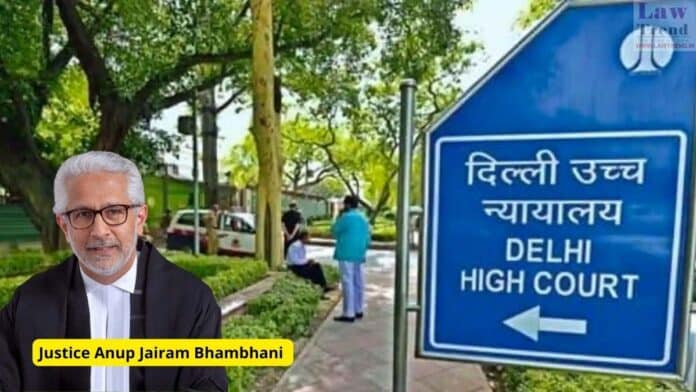Justice Anup Jairam Bhambhani of the Delhi High Court has recused himself from hearing a petition filed by a northeast Delhi riots accused, Asif Iqbal Tanha, against the alleged leak of his “disclosure statement” in a case pertaining to the “larger conspiracy” behind the communal violence that took place here in 2020, saying a court’s act should never have a deleterious impact on the justice system’s credibility.
Justice Bhambhani had earlier expressed his reservations on hearing the matter after the News Broadcasters and Digital Association (NBDA), with whom he had had a “past association”, filed an intervention application in the case.
He said the court’s view must yield in favour of preserving the system’s credibility, which is derived not just from “fairness in fact”, but also from “fairness in perception”.

“In the larger interest of the overall credibility of the justice system, this court is persuaded to recuse from the matter,” the judge opined.
“After giving its anxious consideration to the matter, what prevails with the court is that no act on the part of a court must in any manner have a deleterious impact on the credibility of the justice system. Regardless of the view that this court may hold in relation to the intervention applications filed, that view must yield to the view which better subserves to preserve the credibility of the system, which credibility derives not just from fairness in fact, but equally importantly, from fairness in perception,” the judge said in his order passed last week.
Directing that the petition be listed for hearing before another bench on April 19, subject to orders of the chief justice, the court said it was not expressing any opinion on the merits of the case.
Tanha moved the high court in 2020 against certain media houses disseminating his alleged admission of his guilt before cognisance was taken by the trial court.
He had objected to the “intervention” by the NBDA in the matter on the ground that the association, which was “not interested” in the issue of broadcast of the alleged disclosure statement when a complaint was made to it, had now filed the intervention application in order to ensure that the eventuality of the judge’s recusal “must come true”.
The court, in its order, however stated that even taking a decision on the issue of the association’s intervention plea must follow the overarching principle of fairness.
The NBDA had sought to intervene on the ground that the petition concerned prayers for registration of FIRs against journalists, which would have ramifications, and being a well-recognised body, it thus wanted to assist the court in the matter.
Senior advocate Siddharth Aggarwal, appearing for the petitioner, had earlier asserted that there can be no “intervention” by a third person in a criminal matter and urged the court to consider the fact that the application came to be filed only when the petition, which was filed in 2020, travelled through six judges to reach before this court for adjudication.
He had also argued that the application for intervention was an “attempt to overreach the institution” after Justice Bhambhani suggested sending the plea to another judge on account of his “past association” with the NBDA.
“This is the dirty tricks department at its worst and if we do not stand up to this, I think we are making it far too easy for people to do this exercise,” Aggarwal had said.
The NBDA’s counsel had said the association was not seeking the recusal of the judge, but only intervention.
Additional Solicitor General Sanjay Jain, who appeared in the matter for the Delhi Police, had said the present case was not a “criminal matter as such” and the media organisations have a legitimate interest in its outcome.
He had further said the issue was recusal pertained to the judge’s “conscience” and “nobody has to persuade” him on that issue as there was no application for recusal from any party.
In his petition, Tanha has said he was aggrieved by various publications reporting that he has confessed to orchestrating the 2020 northeast Delhi riots and alleged that he was coerced to sign certain papers in the effective custody of police.
He has contended that the action of two media houses of placing contents from the chargesheet in the public domain has violated the programme code.
Tanha, who was arrested in May 2020, was released from jail in June 2021 after the high court granted him bail in the riots case on the larger conspiracy.
In its status report filed in the case, the police has said while the inquiry could not establish how the details of the investigation were shared with the media, no prejudice was caused to Tanha in his exercise of right to a free and fair trial.
Tanha’s counsel had earlier argued before the high court that the internal inquiry conducted by the police into the leak was an “eyewash”.







